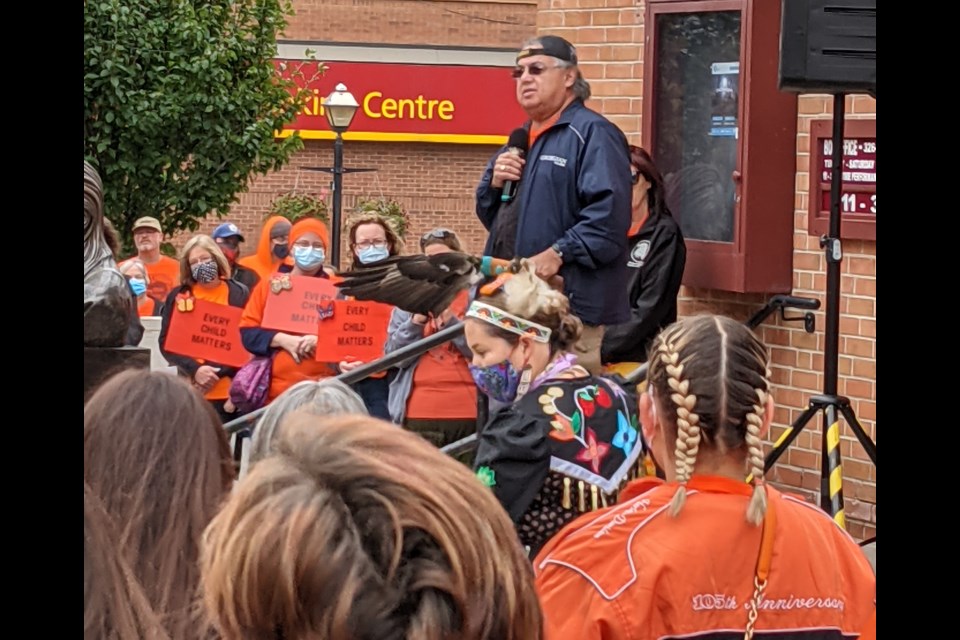On Saturday, we will awaken before the sun reaches out and touches our part of the earth once again. We will awaken to the call of the ancestors as they beckon us to ceremonial grounds across this country so that we may honour the lives of those who survived residential schools and those young ones who did not make it back home.
We will groggily pull orange shirts and hoodies over our heads and head out into the pre-dawn cold and drive to whomever is hosting a sunrise ceremony. There, as the Biidaaban (Bee-daw-bun) appears, that space between morning and night, that is the place where we will place our words. That is where we will humbly speak to our creator and acknowledge the spirit of our survivors, and the little ones who were lost to us.
Then we will cry together. We will laugh together. But we will also draw comfort in the knowledge that we are still here. We are the survivors, borne from survivors. We are the ones who could not be kept down.
We will wear our feathers, we will fill our smudge bowls, we will lift our pipes. We will offer prayers and tobacco to the spirit world. All of which was against the law in Canada not so long ago. All of which were forbidden to the children who attended the residential schools. We will stand, for them.
If not for the spirit of those that refused to give in — those that refused to be beaten down — we would not be here to do this. And of course, it is always for those young ones who lost their lives trying to survive that precarious time in our history as a people, that we gather in ceremony on this day.
We know it as Orange Shirt Day. Canada has come to officially recognize it as the National Day for Truth and Reconciliation.
The orange shirt is worn to signify and commemorate the abuse suffered by one of our survivors of residential school. Phyllis Webstad of British Columbia was a small child when she entered residential school for the first time. In anticipation, she wore a nice bright orange shirt to begin her first year of school. She was immediately told to remove it and to wear the clothing provided for her by school officials. She never saw her shirt again.
On this day, we wear the shirt for her, and all those survivors who lost so much of themselves. The shirt is worn in commemoration. But the shirt is also worn in defiance.
Time inches on. But sometimes not everything changes wholly with that time. Canada still institutionalizes many Indigenous children through child and family services. Although we represent a small portion of the population in Canada, we are over represented in the penal system. Many souls are still being denied their identity as Indigenous people.
The orange shirt depicts the slogan 'Every Child Matters.' But do they?
Do they really matter when many Indigenous children are still living in overcrowded conditions without amenities, clean drinking water, or electricity?
Do they really matter when the government is running pipelines through Indigenous territory rather than through non-native towns and villages?
Do they really matter when one of Canada’s provinces refuse to search for the Native women who were victims of an admitted serial killer, even after he confessed to disposing their bodies in a landfill?
After decades under colonial restrictions, it's more of the same for Indigenous people – survivors, borne from survivors, will be forced to continue to try to lift their head as they tread water in the pool of institutionalism that engulfs their spirit and stifles their growth as a people.
This year we will once again hear politicians utter the word 'reconciliation.' They will saturate speeches with the word. They will pour it liberally over listeners like gloss in hopes that they may be perceived as knowledgeable about the cause.
We will need to move them beyond their shiny words. We will need them to become better educated on the plight of Indigenous people. People who are treaty partners. It’s time for an intervention, so that the next generation of Canadians will not have to apologize for current wrongs being committed against the Indigenous population.
Orange Shirt Day has been a catalyst for change. Bright orange shirts are inviting to the eye and that has helped to illuminate the path toward public education on the residential school experience in Canada.
I am encouraged that over the years I have come to see greater numbers of non-native Canadians standing with us at our ceremonies each year. Reconciliation means that we no longer must stand alone.
Jeff Monague is a former Chief of the Beausoleil First Nation on Christian Island, former Treaty Research Director with the Anishnabek (Union of Ontario Indians), and veteran of the Canadian Forces. Monague, who taught the Ojibwe language with the Simcoe County District School Board and Georgian College, is currently the manager of Springwater Provincial Park.



